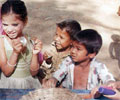
Jesuit Refugee Service, an international Catholic non-governmental organisation urges the international community to take steps to ensure that all displaced children, regardless of their financial situation or legal status, are guaranteed access to quality education. In a press statement, commemorating the Human Rights Day, December 10, today, the rights body argued that though 'individual governments bear the primary responsibility for meeting their educational needs, it is the responsibility of all states to support the efforts of those countries unable to meet these needs with their own resources'.
The Rome based organisation, whose mission is to serve, accompany, and advocate on behalf of refugees and other forcibly displaced persons, also added, "Sixty years after the adoption of the Universal Declaration of Human Rights, millions of refugee and other forcibly displaced children continue to be denied the most fundamental human rights, including access to appropriate educational opportunities."
Quoting Peter Balleis SJ, the JRS International Director, the statement elaborated that even where education facilities were available to refugees 'most often in camp settings, the quality of schooling is often poor'.
"School buildings are usually inadequate and didactic materials are either lacking or nonexistent. Most troubling is the lack of qualified teachers. Investment in the physical infrastructure of schools and teaching quality is urgently needed', Peter Balleis insisted.
JRS comes across displaced parents living in poverty forced to choose between paying for their children's education and buying basic essentials in most of the countries of developing world.
Even when education is nominally free, teacher’s salaries are often not paid, so families are forced to contribute. Too often, refugee parents, unable to afford the costs of their children s education, are forced to take them out of school. Unfortunately, those in the most vulnerable circumstances suffer disproportionately, including girls and children with disabilities. In fact, an estimated 98 per cent of children with disabilities in the developing world, many of them victims of conflict and landmine incidents, do not attend school, the statement added.
Mentionable that JRS has visibility in over 50 countries, where more than 1,400 staffs work with an aim to facilitate access to education, health and other social needs for nearly 500,000 refugees and other forcibly displaced persons. Its services are made available to refugees and displaced persons regardless of their race, ethnic origin, or religious beliefs, informed James Stapleton, International Communications Coordinator of the organisation. He also added, "It provides primary and secondary education to approximately 170,000 children, and undertakes advocacy to ensure that all displaced children are provided with a quality education."
As JRS staff well know, the problem of access to education is not limited to developing countries. Shockingly, thousands of children are held in detention centres in industrialised nations, as well as developing states, without the possibility of going to school. While some children receive classes in closed centres, their extended confinement risks causing psychological harm and impaired cognitive development. Upon release, many children continue to be denied an education by their precarious economic circumstances. In some European countries, such as France, forcibly displaced parents are afraid to send their children to school for fear that they may be arrested and detained once again.
Peter Balleis also highlighted the issue of appalling lack of appropriate educational opportunities to displaced children which adversely affect both the children and their countries in the future adding, "A generation of children is being lost. Given educational opportunities, they have the potential to rebuild their lives, to help rebuild their communities and thus to strengthen and stabilise their countries for generations to come."
The statement however admitted that 'the problem of access to education is not limited to developing countries'. Shockingly, thousands of children are held in detention centres in industrialised nations, as well as developing states, without the possibility of going to school. While some children receive classes in closed centres, their extended confinement risks causing psychological harm and impaired cognitive development. Upon release, many children continue to be denied an education by their precarious economic circumstances. In some European countries, such as France, forcibly displaced parents are afraid to send their children to school for fear that they may be arrested and detained once again, it concluded.
|
|


Comments: